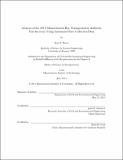Analysis of the 2012 Massachusetts Bay Transportation Authority fare increase using automated fare collection data
Author(s)
Pincus, Kate S. (Kate Samantha)
DownloadFull printable version (4.232Mb)
Other Contributors
Massachusetts Bay Transportation Authority.
Advisor
John P. Attanucci.
Terms of use
Metadata
Show full item recordAbstract
Transit agencies commonly increase fares to raise revenue, reduce service to lower costs, or combine the two strategies. Fare increases impact specific subsets of transit users in different ways based on their demographics and the transit system fare structure. Automated fare collection (AFC) systems enable increased fare structure complexity, such as fare differentials by user group or ticket medium. While AFC systems create the opportunity for more intricate fare scenarios, they also record transaction-level ridership data that can be used to better understand the impacts of such changes. This thesis presents a study of the 2012 Massachusetts Bay Transportation Authority (MBTA) fare increase using AFC system data. Fares increased by an average of 23%, but the increases varied by fare type, which is based on the user type and medium type, and trip mode. Elasticities by fare type were developed using the ridership changes from April - June 2012 to April - June 2013. Variation of usage within the primary fare type categories was also analyzed before and after the fare increase. Two longitudinal panels were developed to study changes in individual behavior over time: a panel of cards active in April - June 2012 and 2013, to observe changes over the period of the fare increase, and a panel of cards active in September - November 2012 and 2013, to serve as a baseline for comparison in absence of a fare increase. Each panel contained approximately 40% of the cards used in the corresponding three-month period in 2012. The usage distribution of the cards in each panel was representative of the distribution of the general population of cards active during each time period, with the exception of very infrequent stored value users. A regression model was developed to attempt to separate the effects of the fare increase, internal factors such as frequency of use and participation in the corporate pass program, and external factors such as weather, employment, and gas prices on the usage changes within both panels. While the effect of the fare increase on change in usage was negative, low R-squared values for both models indicate that the heterogeneity in usage changes is due to additional factors other than those included in these models.
Description
Thesis: S.M. in Transportation, Massachusetts Institute of Technology, Department of Civil and Environmental Engineering, 2014. This electronic version was submitted by the student author. The certified thesis is available in the Institute Archives and Special Collections. Cataloged from student-submitted PDF version of thesis. Includes bibliographical references (pages 101-102).
Date issued
2014Department
Massachusetts Institute of Technology. Department of Civil and Environmental EngineeringPublisher
Massachusetts Institute of Technology
Keywords
Civil and Environmental Engineering., Massachusetts Bay Transportation Authority.